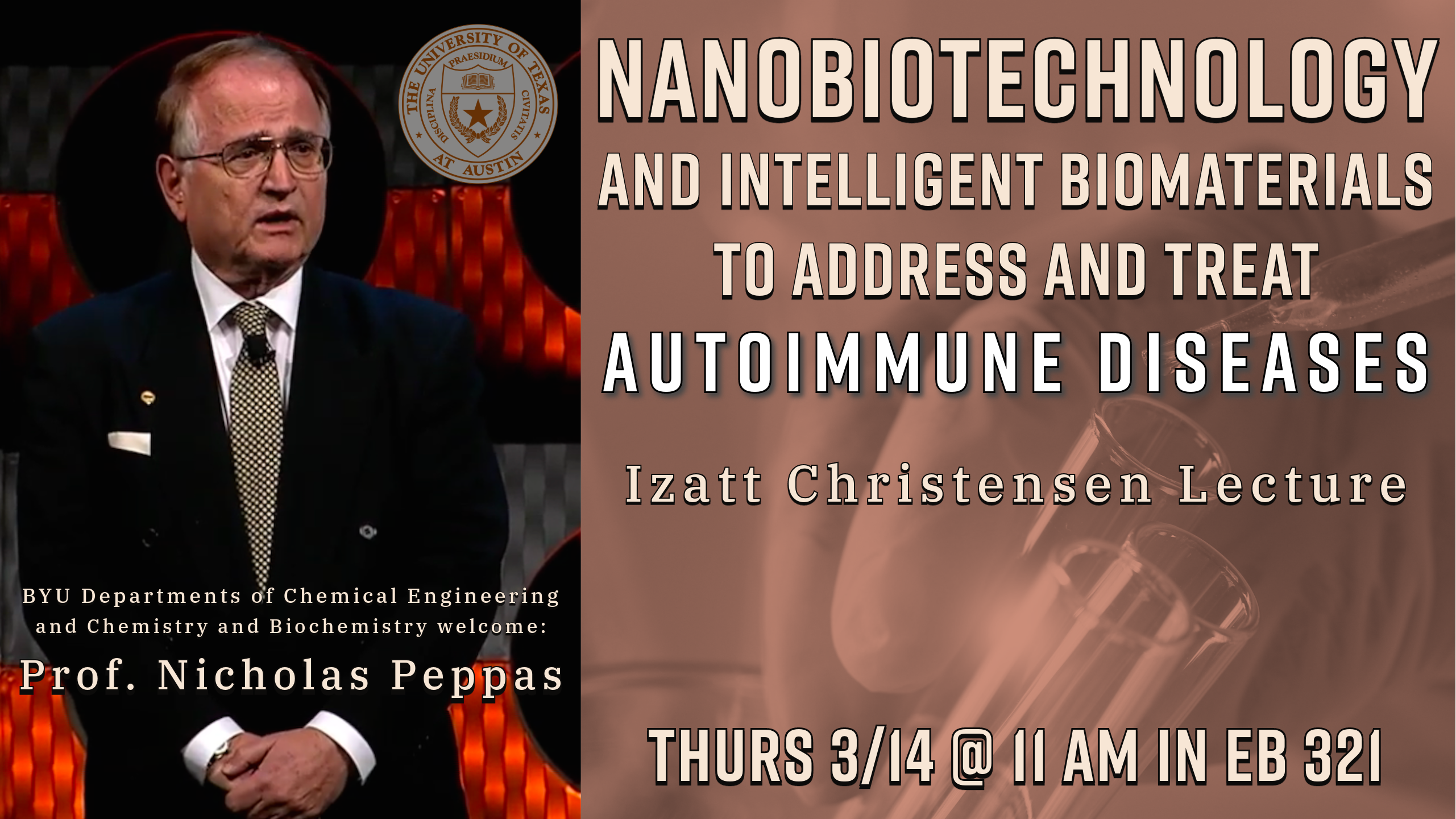BYU Graduate Seminars - Winter 2024
| Date | Time | Topic | Presenter |
| Jan 11 | 11 AM | Computer Vision: Digit Recognition using Linear Algebra | Jon Loftin, PhD MathWorks |
| Jan 18 | 11 AM | Bio and Research Video Overview | Graduate Students |
| Jan 25 | 11 AM | Plutonium Electrorefining | Jared Mason Bonnie Coleman Los Alamos National Lab |
| Feb 1 | 11 AM | Safety Clinic for Students and Faculty | Clint Guymon Brigham Young University |
| Feb 8 | 11 AM | Exergy Analysis for Energy Systems | Thomas Adams II NTNU |
| Feb 15 | 11 AM | 3-Minute Thesis Competition | Graduate Students |
| Feb 22 | 11 AM | Generative AI for Engineers | John Hedengren Brigham Young University |
| Feb 29 | 11 AM | LANL Actinide-Molten Salt Research: MSRs, Pu Pyroprocessing...and Beyond | Marisa Monreal Los Alamos National Laboratory |
| Mar 7 | 11 AM | Insights and Innovations: Science and Engineering-Focused Machine Learning Competitions | Walter Reade Kaggle |
| Mar 13 | 4 PM MSRB 321 | Izatt-Christensen Public Lecture | Nicholas Peppas UT Austin Frances Ligler Texas A&M |
| Mar 14 | 11 AM EB 321 | Izatt-Christensen Technical Lecture | Nicholas Peppas UT Austin |
| Mar 21 | 11 AM | BYU HBLL Production Studio | Graduate Students |
| Mar 28 | 11 AM | BYU HBLL Production Studio | Graduate Students |
| Apr 4 | 11 AM | Research Profile Videos | Graduate Students |
| Apr 11 | 11 AM | PhD Job Search Blueprint | Isaiah Hankel Cheeky Scientist |
Upcoming Izatt Christensen Lectures

Nicholas Peppas and Frances Ligler will give a joint session on March 13 followed by a Technical Lecture by Nicholas Peppas on March 14. Frances Ligler will also deliver a Technical Lecture the day before the Public Lecture on March 12. See the Chemistry Seminar Schedule for additional details.
Abstract
Recent advances in the biomedical engineering field encompass a wide range of technologies, processes, (bio)materials, hybrid systems, medical devices, modern imaging techniques as well as new technologies for complex calculations, large data analysis and advanced computational techniques. The ultimate goals of all these developments is the ability to conduct non-invasive diagnosis, cause recognition and therapeutic action, often with improved automation and process differentiation but also containment or reduction of costs and ultimately with improvement of the quality of life of our patients. New intelligent, physiologically responsive materials with long term bio- and blood compatibility is the next goal of the field. Advanced imaging techniques continue to be an important goal of the field of biomedical engineering. Biomarkers recognition is of utmost importance in medical applications including imaging, drug delivery, and regenerative medicine. This continues to be an important goal of the field. Use of biomimetic materials in advanced medical devices provides biomolecule recognition which is of utmost importance in medical applications, ranging from the design of diagnostic platforms to the development of new drug delivery systems. Antibodies are the gold standard for biologic recognition, but their incorporation into many clinical products is impaired by environmental instability, and expense. New processes re needed to achieve biomolecule specificity through spatial incorporation of functional monomers, thus providing an inexpensive and highly stable platform for medical applications.
Biography
Nicholas A. Peppas is a distinguished chaired professor in Biomedical Engineering, Chemical Engineering, Pediatrics, Surgery and Pharmacy at the University of Texas at Austin. Over 48 years his group has set the fundamentals of molecular structures of networks and hydrogels, analyzed the solute transport in complex networks, studied molecular recognition in complex biological fluids, and developed new intelligent biomaterials, nanodevices, therapeutic agent delivery systems for oral, buccal, sublingual, and gastrointestinal delivery of drugs, peptides, and proteins. 1,800 publications, IF of H=205 (202,000 citations). Numerous US patents issued or pending, 3 start-up companies. Awards include NAE Founders Award, NAM Adam Yarmolinsky Award, AAPS Pharmaceutical Global Leader and Distinguished Pharmaceutical Scientist Awards, Elsevier Biomaterials Global Leader. Peppas is a member of eighteen Academies including NAE, NAM, American Academy of Arts and Sciences, National Academy of Inventors, Academia Europaea, International Academy of BME, Canadian Academy of Engineering, Indian National Academy of Engineering, Chinese Academy of Engineering, Korean Academy of Science and Technology, National Academy of France, Royal Academy of Spain, Academy of Athens, Greece, Romanian Academy of Scientists, Mexican Academy of Sciences & Academy of Texas. He is the Editor-in-Chief of “Regenerative Biomaterials” (Oxford). He holds a Dipl. Eng. from NTU of Athens (1971), a Sc.D. from MIT (1973) and is the recipient of fifteen honorary doctorates and professorships from the Universities of Ghent, Parma, Santiago de Compostela, Ljubljana, Bucharest, Tel Aviv, four Chinese Universities and four Greek Universities (Athens, Patras, Thessaloniki, and the National Technical University of Athens). He has been honored by the Giulio Natta Medal from Italy, the APV Medal from Germany and the Ellis Island Medal of Honor from the USA.
Graduate Seminar Instructions
Graduate seminars are held every week on Thursday at 11 AM Mountain Time in 321 EB (Engineering Building). Seminars consist of industrial and academic research in chemical engineering and related disciplines. Seminar speakers typically include professors, graduate students, industrial collaborators, and other guests.
Graduate Students: Attendance at seminars is required. Please register your attendance on Learning Suite.
Speakers: Please plan to end at 11:45 to allow for questions.